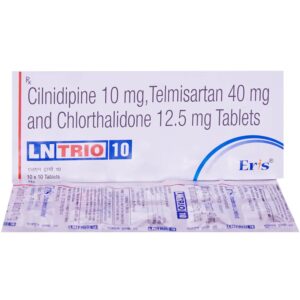CHLORMETHINE + TELMISARTAN + CILNIDIPINE
Chlormethine: Chlormethine, also known as mechlorethamine or nitrogen mustard, is a chemotherapy drug used to treat certain types of cancers, particularly Hodgkin’s lymphoma and some types of leukemia.
Mechlorethamine works by interfering with DNA replication in cancer cells, leading to cell death. It is an alkylating agent, which means it adds alkyl groups to the DNA molecule, causing structural damage and preventing the cancer cells from dividing and multiplying.
The drug is typically administered intravenously or applied topically in the form of a cream or gel. The specific dose and frequency of administration depend on the type of cancer being treated and the individual patient’s condition, so it is important to follow the instructions provided by the healthcare provider.
Common side effects of chlormethine include nausea, vomiting, diarrhea, mouth sores, decreased appetite, and hair loss. It can also suppress bone marrow function, leading to a decrease in white blood cells, red blood cells, and platelets. This increases the risk of infections, anemia, and bleeding.
Some patients may experience allergic reactions to chlormethine, which can include rash, itching, difficulty breathing, or swelling of the face, lips, tongue, or throat. Other less common side effects include liver toxicity, kidney damage, and infertility.
It is important to note that chlormethine can cause harm to developing fetuses, so it should not be used during pregnancy or while breastfeeding. Additionally, it is important to use appropriate safety precautions when handling chlormethine, as it can be irritant to the skin, eyes, and respiratory system.
As with any medication, it is essential to consult a healthcare professional for personalized advice regarding the use, dose, and potential side effects of chlormethine.
Telmisartan: Telmisartan is a medication commonly prescribed for the treatment of hypertension (high blood pressure). It belongs to a class of drugs known as angiotensin II receptor blockers (ARBs). Telmisartan works by blocking the action of angiotensin II, a hormone that causes blood vessels to narrow, thereby reducing blood pressure and improving blood flow.
This drug is usually taken orally in the form of tablets and the dose may vary depending on the individual’s condition and response to treatment. Typical starting doses for adults range from 20 mg to 80 mg per day. It is important to follow the dosage instructions provided by the healthcare professional.
Like any medication, Telmisartan can cause side effects. Common side effects include dizziness, headache, back pain, muscle cramps, diarrhea, and upper respiratory tract infections. It is essential to inform a healthcare provider of any persistent or severe side effects.
Telmisartan is also sometimes used in the treatment of cardiovascular conditions such as congestive heart failure and to reduce the risk of heart attack, stroke, or kidney problems in patients with diabetes. However, it is crucial to consult with a healthcare professional before starting or adjusting any medication regimen.
Cilnidipine: Cilnidipine is a calcium channel blocker medication. It is primarily used to treat hypertension (high blood pressure).
The mechanism of action of cilnidipine involves blocking the influx of calcium ions into the smooth muscles of blood vessels, resulting in vasodilation. It has a dual action, selectively blocking both L-type and N-type calcium channels. By blocking these channels, it reduces peripheral vascular resistance and lowers blood pressure.
The usual starting dose for cilnidipine is 5 mg once daily. Depending on the patient’s response, the dosage may be increased to 10 mg once daily. It is typically taken orally with or without food.
Common side effects of cilnidipine include dizziness, headache, flushing, peripheral edema (swelling in the extremities), and fatigue. These side effects are generally mild and transient. Less common side effects may include palpitations, increased heart rate, nausea, abdominal pain, and allergic reactions.
It is important to note that cilnidipine should not be taken by patients with a known hypersensitivity to calcium channel blockers or with severe aortic stenosis (narrowing of the aortic valve). It may also interact with other medications, so it is essential to inform the healthcare provider about any other medications being taken.
Overall, cilnidipine is an effective antihypertensive agent that works by blocking calcium channels, resulting in vasodilation and lowering of blood pressure. It is generally well-tolerated, but it is important to be aware of potential side effects and any drug interactions.

